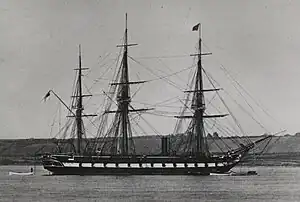 | |
| History | |
|---|---|
| Name | SMS Gazelle |
| Builder | Königliche Werft, Danzig |
| Laid down | 1855 |
| Launched | 19 December 1859 |
| Completed | 22 May 1861 |
| Commissioned | 15 May 1862 |
| Stricken | 8 January 1884 |
| Fate | Sold for scrap, 1906 |
| General characteristics | |
| Class and type | Arcona-class frigate |
| Displacement | 2,300 tonnes (2,264 long tons) |
| Length | 73 m (239 ft 6 in) |
| Beam | 13 m (42 ft 8 in) |
| Draught | 6.5 m (21 ft 4 in) |
| Sail plan | Full-rigged ship |
| Speed | 12 knots (22 km/h; 14 mph) |
| Complement | 380 |
| Armament | 17 × 15 cm (5.9 in) guns |
SMS Gazelle was an Arcona-class screw-driven frigate of the Prussian Navy built in the 1850s. The ship was laid down in 1855 at the Royal Dockyard in Danzig, launched on 19 December 1859, completed on 22 May 1861, and commissioned into the Navy almost a year later on 15 May 1862.[1][2]
Gazelle was built in Danzig and launched in 1855, but engine problems led to her being put into service only in 1862. She undertook a voyage into East Asia under Arthur von Bothwell to replace her sister ship Arcona in Shanghai. In 1866, Gazelle was sent to the island of Lesbos to provide assistance following the earthquake. In 1872 she was stationed with Vineta in the West Indies to protect German interest in Haiti. From June 21, 1874 to April 28, 1876 it was sent on a research expedition to the southern hemisphere under Georg Freiherr von Schleinitz. Researchers aboard included the zoologist Theophil Studer, Friedrich Carl Naumann and Carl Hüesker. The astronomical side was handled by Karl Börgen and Ladislaus Weinek, with the aim of studying the transit of Venus on December 9, 1874 at Kerguelen.[3] The Gazelle Harbor in Bougainville was named after the ship.
She served on overseas duties for the majority of her career, in 1864 she sailed to Japan.[4] On 8 January 1884, when she was stricken from the naval register. She was used as a barracks ship in Wilhelmshaven thereafter, until she was sold for scrap in 1906 for 36,000 gold marks and broken up.[5]
Footnotes
- ↑ Gröner, pp. 42–43
- ↑ Gardiner, p. 250
- ↑ Gould, W. John (2022-09-22). "HMS Challenger and SMS Gazelle – their 19th century voyages compared". History of Geo- and Space Sciences. 13 (2): 171–204. Bibcode:2022HGSS...13..171G. doi:10.5194/hgss-13-171-2022. ISSN 2190-5010.
- ↑ von Tirpitz, Alfred (1919). My Memoirs (Volumes I & II) Kindle Edition. Dodd Mead & Company. p. 171. ASIN B083QPBBJK.
- ↑ Gröner, p. 43
References
- Gardiner, Robert, ed. (1979). Conway's All the World's Fighting Ships 1860–1905. London: Conway Maritime Press. ISBN 0-85177-133-5.
- Gröner, Erich (1990). German Warships: 1815–1945. Vol. I: Major Surface Vessels. Annapolis, MD: Naval Institute Press. ISBN 0-87021-790-9.
- Nottelmann, Dirk (2022). Wright, Christopher C. (ed.). "From "Wooden Walls" to "New-Testament Ships": The Development of the German Armored Cruiser 1854–1918, Part I: "Humble Beginnings"". Warship International. LIX (2): 102–129. ISSN 0043-0374.
External links
- Die Forschungsreise S. M. S. "Gazelle" in den Jahren 1874 bis 1876 (Scientific results of the 1874-1876 expedition)